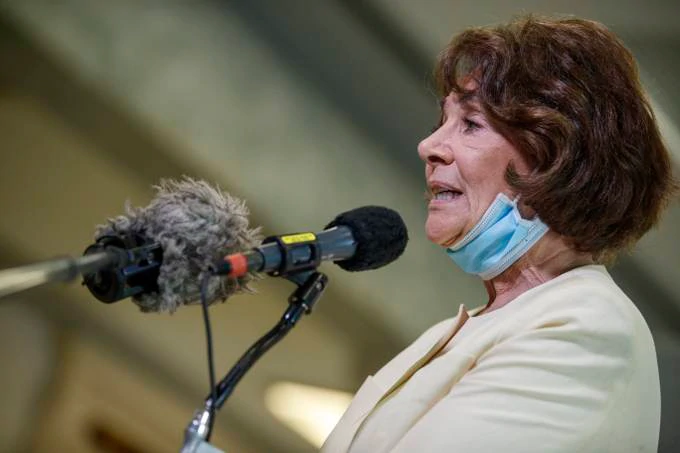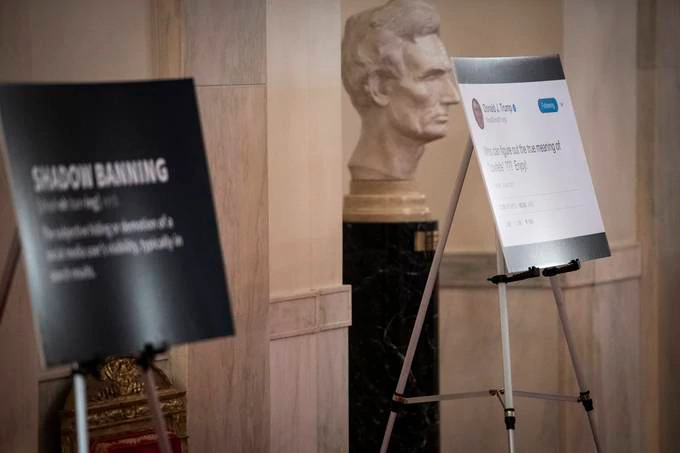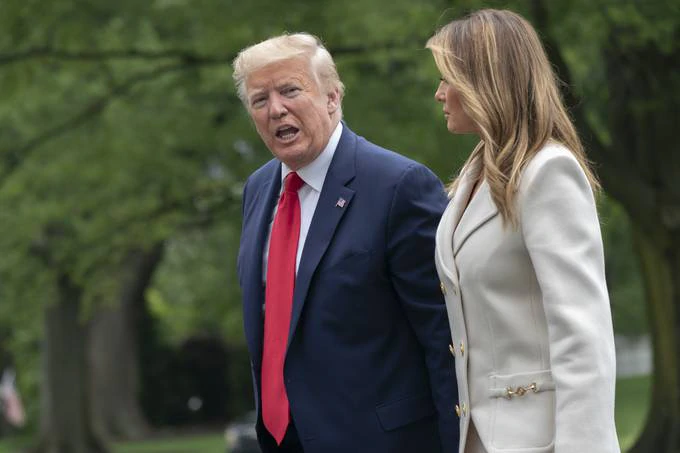with Tonya Riley
The space industry is preparing for a historic moment of liftoff tomorrow.
Elon Musk’s firm SpaceX is set to become the first private company to launch humans into orbit, as long as the weather cooperates. The launch will be the most high-profile test to date for the company — which my colleague Christian Davenport reports was once criticized as a billionaire’s long shot fantasy.
“One industry veteran told me, ‘You know their rockets are put together with rubber bands and sealing wax,’” Lori Garver, a former deputy National Aeronautics and Space Administration who pushed the agency to outsource human spaceflight to the private sector, told Christian. “‘It’s not real. It won’t fly.’”
But Wednesday’s launch of SpaceX’s Crew Dragon capsule with astronauts aboard underscores just how much Musk’s company has shaken up the space business.
— Elon Musk (@elonmusk) May 24, 2020
The company may earn a place in the history books for ushering in a new era of space travel.
The mission marks a broader shift at the NASA away from the costly and time-consuming project of building government-owned spacecraft. If tomorrow’s launch is a success, it could signal that more future space endeavors will be based on similar partnerships between corporations and governments.
The mission is also poised to end a drought of launches of humans to orbit from U.S. soil since the space shuttle retired almost a decade ago. The rise of greater collaboration between companies like SpaceX and the federal government could reduce U.S. dependence on foreign space programs such as Russia, which has ferried American astronauts to the space station in intervening years.
The flight marks an apparent victory for SpaceX in its long-running rivalry with Boeing.
Countries used to vie against one another in space achievements, as the United States and Soviet Union famously did in the effort to land a man on the moon. But these days, companies are defining the space race.
No one thought that Musk’s relative upstart would beat the legacy aerospace giant to space, Christian writes. The fact that SpaceX appears to have won the race underscores just how much space travel has changed as it becomes increasingly privatized.
SpaceX may have had an advantage in its contract with NASA because it’s known for reusing materials, making it more cost efficient. The company has built a reputation for repurposing all sorts of things, even a 125,000-gallon liquid nitrogen tank that an employee found scrapped at an old abandoned Cape Canaveral launch site.
“We had to be super scrappy,” Musk once told The Washington Post. “If we did it the standard way, we would have run out of money. For many years, we were week to week on cash flow, within weeks of running out of money. It definitely creates a mind-set of smart spending. Be scrappy or die: Those were our two options. Buy scrap components, fix them up, make them work.”
But SpaceX still has had high-profile problems along its path.
Several incidents have raised questions about whether there’s enough government oversight of private space companies. The company has had two Falcon 9 rockets explode, and it struggled with a parachute system needed to slow down the spacecraft on its return to Earth. The company said last year that its Dragon capsule was completely destroyed during a test.
Since these incidents, SpaceX has uncovered what caused the problems and fixed them, NASA tells Christian.
The launch will also be a pivotal assessment of the Trump administration’s space ambitions.
“If it goes well, it would be a moment of triumph for an administration that boasts it is ‘renewing American leadership in space’ and would no doubt end up in election-year campaign ads,” Christian writes. “If something goes wrong, it would be a staggering blow that could send the space agency reeling and jeopardize the White House’s signature mission to return astronauts to the moon by 2024.”
President Trump and Vice President Pence are planning to attend the launch, which is scheduled for 4:33 p.m. Wednesday from launchpad 39A at the Kennedy Space Center in Florida.
Trump has previously shown an interest in having high-profile “space barons,” such as Musk and Washington Post owner Jeff Bezos, and their companies play a role in rejuvenating space travel, Christian writes.
“Rich guys, they love rocket ships,” Trump said in 2018. “That’s good. That’s better than us paying for them.”
A pelican takes off from its perch near the Kennedy Space Center in Florida. (Gregg Newton/AFP/Getty Images)
The coronavirus will make this launch different from others.
Don’t expect to see the usual crowds near the Kennedy Space Center, The Verge’s Nicole Wetsman writes. NASA is taking some precautions to ensure the safety of the astronauts and ground crew by conducting temperature checks, and spreading people out at Mission Control. They’ll disinfect rooms regularly and put up Plexiglass between different work stations.
“We’re looking at all the things where we can practice the guidelines for social distancing, and at the same time, launch this very important mission to the International Space Station,” said Steve Stich, deputy manager of NASA’s Commercial Crew Program, during a press call this month.
Programming note: The Washington Post will tomorrow broadcast the SpaceX launch on our homepage and on YouTube. The Post’s Libby Casey will anchor the broadcast with space industry reporter Davenport, which will include exclusive behind-the-scenes access to the astronauts and launch.
Guests will include NASA astronaut Suni Williams, and former NASA astronauts Frank Culbertson Jr. and Pam Melory, as well as Ellen Stofan, the Director of the Smithsonian’s Air & Space Museum. The program will feature an exclusive online interview with Elon Musk and reporting and analysis from the Post’s Joel Achenbach, Whitney Leaming and Whitney Shefte.
Take some time to read this fun article from Christian before tomorrow’s launch:
Note to readers: The Technology 202 will only publish today, Wednesday and Thursday this week. We will return to our normal schedule next week.
Our top tabs
A new bill would prohibit tech giants from offering political advertising tools that target users based on demographics or behavioral data.

Rep. Anna G. Eshoo (D-Calif.) speaks to members of the news media May 14 on Capitol Hill. (Shawn Thew/Pool/AP)
The bill, introduced by Rep. Anna G. Eshoo (D-Calif.), would apply to all communications or advocacy for a federal candidate and would be enforced by the Federal Election Commission. Democrats have raised concerns since the 2016 election that “microtargeting” can make it more challenging to police disinformation in political ads.
“Microtargeting political ads fractures our open Democratic debate into millions of private, unchecked silos, allowing for the spread of false promises, polarizing lies, disinformation, fake news, and voter suppression,” Eshoo said in a news release. “With spending on digital ads in the 2020 election expected to exceed $1.3 billion, Congress must step in to protect our nation’s Democratic process.”
The Banning Microtargeted Political Ads Act has the support of a dozen privacy and campaign finance experts and advocacy groups, including Democratic FEC Commissioner Ellen Weintraub.
Rep. David N. Cicilline (D-R.I.) is also expected to introduced legislation today that would limit use of the technology to targeting users only on the basis of age, gender and location. Eshoo’s bill has greater restrictions on how location data can be used to microtarget.
Approximately 72 percent of Americans also favor greater regulation of the practice, according to a Knight-Gallup poll earlier this year.
Officials in the Chinese tech hub of Hangzhou may make its coronavirus health-tracking technology permanent.

A worker hangs a sign at a pork counter inside a supermarket in Hangzhou, China. (China Daily/Reuters)
The proposed permanent version of the tool would assign individuals a color-coded health badge based on “a collation of their medical records, physical examination results, and lifestyle habits, such as smoking and alcohol consumption,” the Wall Street Journal’s Liza Lin reports. Officials have used QR-code-based health-rating apps to control the movement of residents to limit the spread of the virus during the pandemic.
The announcement sparked a backlash on Chinese social media, where residents accused the city of using the pandemic as an excuse to expand government monitoring of citizens.
It also came days after Robin Li, chief executive of the Chinese tech giant Baidu and a member of a Chinese political advisory body, introduced a new nonbinding proposal urging legislators to wind down collection of personal information used in the coronavirus response. There has been a recent push in the nation for increased privacy protections against the government, Lin reports.

European Union flags. (Jasper Juinen/Bloomberg News)
Ireland’s top privacy watchdog has yet to crack down on Big Tech in the two years since Europe’s landmark data protection law took effect, critics say.
Ireland’s Data Protection Commission has yet to finalize investigations into any tech companies and has struggled to keep up with thousands of complaints introduced under the General Data Protection Regulation, Mark Scott of Politico reports.
“Nothing has really changed,” said Fred Logue, a Dublin-based privacy lawyer. “When you deal with them, you don’t get the sense that they are there to vindicate data protection rights.”
Of the nearly 7,000 complaints the agency received last year, about 4,500 were completed without any specific enforcement action and about 1,000 are awaiting fines or enforcement actions.
European Union officials in other countries have also complained about the agency’s slow pace. Several told Politico that they waited months for little or no updates for cases referred to Ireland. France and Germany moved to take action against Google without waiting on Ireland.
Helen Dixon, who heads the agency of more than 140 regulators, defended its actions. “We are now on a pathway where we are going to resolve, one by one, as fast as we can with as many resources as we can, these very entrenched issues,” she told Scott.
The agency expects to launch fines against Facebook and Twitter by early summer — a year after the enforcement actions were expected.
Rant and rave
More thoughts on GDPR’s birthday yesterday from European Parliament member Sophie in ’t Veld:
🚫 stop abuse of GDPR. Courts/authorities in 🇷🇴, 🇵🇱, 🇸🇰, & 🇭🇺 invoke GDPR to attack NGOs and investigative journalism
🌎 safe international data transfers: EU citizens’ data should not be intercepted for mass surveillance once transferred to other countries, particularly 🇺🇸&🇬🇧
— Sophie in ‘t Veld (@SophieintVeld) May 25, 2020
Trump tracker
President Trump is considering creating a White House commission to review alleged online bias against conservatives.

A poster of an enlarged tweet is seen at the Presidential Social Media Summit in July 2019 at the White House. (Jabin Botsford/The Washington Post)
The administration may also encourage the Federal Communications Commission and the FEC to embark on similar reviews, John D. McKinnon and Alex Leary report in the Wall Street Journal.
President Trump has long railed against an alleged anti-conservative bias from online platforms, even hosting a summit on the subject last summer. Tech companies have consistently disputed his claims. An independent audit of Facebook last year found no evidence supporting his claims.
More White House news:
The digital race to 2020
A key evangelical group supporting Trump is upping its data mining efforts to give the campaign a boost amid the pandemic.

President Trump and first lady Melania Trump return to the White House. (Chris Kleponis/Pool/EPA-EFE/Shutterstock)
United In Purpose “plans to use data mining to identify millions of new voters and target them with cheap ads on Facebook,” Lee Fang of the Intercept reports.
The group, founded by a former technology entrepreneur, is powered by Pioneer Solutions, a data-mining operation used to find and activate religious voters. A leak of the group’s database showed that it has demographics information on nearly 200 million Americans. It also shares connections with CatholicVote, a group that has used cellphone data to target Catholic voters in support of the Republican Party.
Inside the industry
Amazon, Microsoft and Google are providing web services to Chinese surveillance firms blacklisted by the United States for human rights abuses.

A Chinese flag hangs near a security camera outside a shop in Beijing. (Mark Schiefelbein/AP)
The services include email, website hosting and log-in authentication, according researchers at privacy website Top10VPN, CNBC reports.
The new report alleges that Amazon and Google are providing Web services for Dahua Technology and Hikvision, two video surveillance companies blacklisted for aiding in the abuses of Uighurs, China’s Muslim minority population. Artificial intelligence start-ups SenseTime and Megvii were also blacklisted for human rights abuses but appear to still be using Microsoft technology.
All four Chinese companies have disputed allegations of their involvement in human rights abuses. None of the U.S. companies mentioned in the report immediately responded to CNBC for comment.
More industry news:
Trending
Bookmark this
Daybook
- Dominic LeBlanc, president of the Queen’s Privy Council for Canada, will host a virtual event and make an announcement related to countering election interference, along with Microsoft and the Alliance for Securing Democracy, at 10 a.m. Register here.
- Ranking Digital Rights will host an event “Getting to the Source of the 2020 Infodemic: It’s the Business Model,” on Wednesday at 11:30 a.m.
Before you log off
Nose for news? We’ve got you covered:
Being informed is my favorite song pic.twitter.com/Cx8Lnf4jVq
— Dave Jorgenson (@davejorgenson) May 23, 2020















